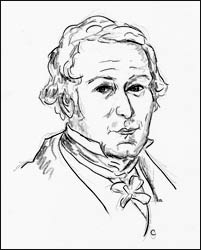The Nine Principles of Sir Robert Peel
Sir Robert Peel was instrumental in having the Act for Improving the Police in and Near the Metropolis (the Metropolitan Police Act) passed in the English Parliament in 1829. Peel had a specific vision as to the principles under which the police should operate. The nine principles that he penned nearly 200 years ago are just as important to proper police operations today as they were in early nineteenth-century London.
- The basic mission for which the police exist is to prevent crime and disorder.
- The ability of the police to perform their duties depends on public approval of police actions.
- Police must secure the willing cooperation of the public in voluntary observance of the law to be able to secure and maintain the respect of the public.
- The degree of cooperation of the public that can be secured diminishes proportionately to the necessity to use physical force.
- Police seek and preserve public favor not by catering to public opinion but by constantly demonstrating absolute impartial service to the law.
- Police use of physical force to the extent necessary to secure observance of the law or to restore order only when the exercise of persuasion, advise and warning is found to be insufficient.
- Police, at all times, should maintain a relationship with the public that gives reality to the historic tradition that the police are the public and the public are the police, the police being only members of the public who are paid to give full-time attention to duties which are incumbent on every citizen in the interests of community welfare and existence.
- Police should always direct their attention strictly towards their functions and never appear to usurp the powers of the judiciary.
- The test of police efficiency is the absence of crime and disorder, not the visible evidence of police action in dealing with it.

Sir Robert Peel
Police misbehavior can usually be found to violate one or more of Peel’s nine principles. Perhaps more importantly, we have allowed our police to stray far beyond the basic mission of prevention of crime and disorder first laid out by Peel. Indeed, in most instances, police no longer look like police officers because they have taken on a more militaristic look. For example, the dress shirts, tie, dress slacks, and shined dress shoes have given way to a different look. Many of today’s police dress in dark blue or black wash and wear pants and shirt, wtih some police departments choosing a one-piece jumpsuit. Shined dress shoes have been replaced by either dark tennis shoes or laced up paratrooper jump boots and bloused pants. It is now common to see police officers attired in assault gear complete with helmet with automatic assault weapons, with trigger finger at the ready.
Along with revised uniforms has come a revision of the vision of policing. Police officers no longer see themselves as members of a "helping profession," as conceived by Sir Robert Peel, but instead view themselves as “law enforcers." Whereas law enforcement had always played a minor role in policing, the shift in paradigm toward "enforcement" can be seen in the many martial metaphors in current use: “War on Crime,” “War on Drugs,” and now “War on Terror.” This is not their fault but rather ours. We have placed upon our police ever increasing demands, making them responsible for social problems, which are beyond their control. The latest increase in responsibility has come by classifying police as the first line of defense against acts of terrorism. Little wonder they have become increasing militaristic in both uniform and thought. Reversing police militarism will not be easy because it has become so well entrenched and is reinforced by the constant drumbeat of “War on Crime, “War on Drugs,” and “War on Terror.” Unless serious effort begins to reclaim policing, Peel’s Nine Principles will never become a reality.
Reference
Dempsey, J. and Forst, L. (2008). An introduction to policing. Belmont, CA: Thompson-Wadsworth, 7-8.
